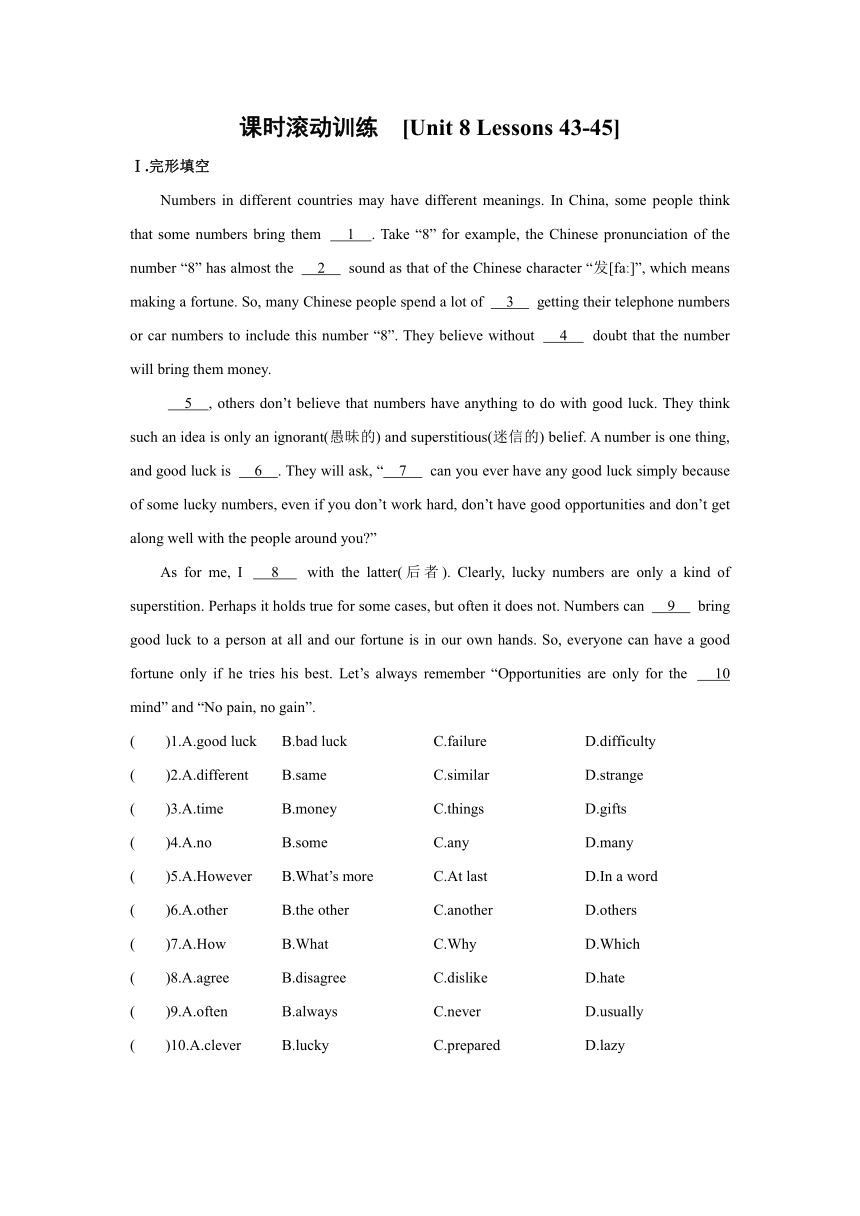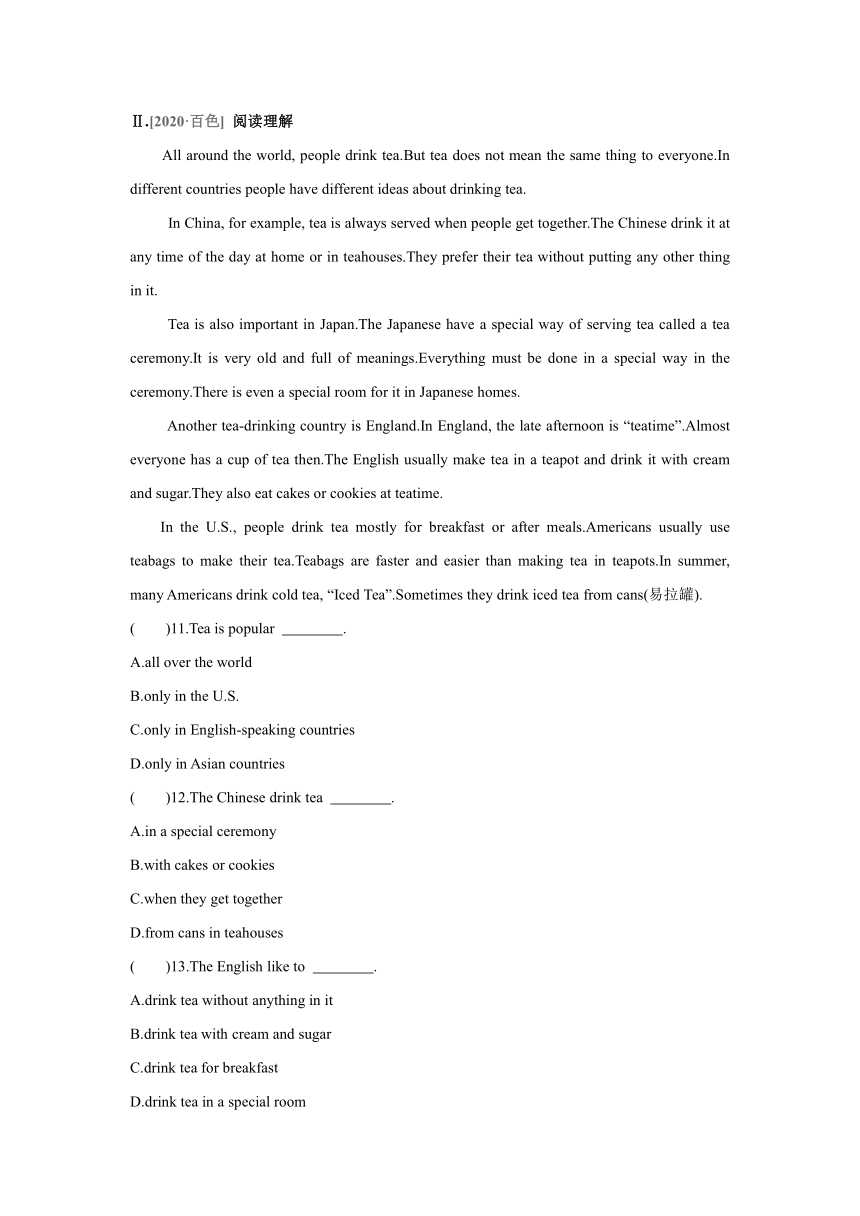冀教版英语 九年级下册 滚动训练 Unit 8 Culture Shapes Us. Lessons 43-45(含答案)
文档属性
| 名称 | 冀教版英语 九年级下册 滚动训练 Unit 8 Culture Shapes Us. Lessons 43-45(含答案) |

|
|
| 格式 | docx | ||
| 文件大小 | 40.2KB | ||
| 资源类型 | 教案 | ||
| 版本资源 | 冀教版 | ||
| 科目 | 英语 | ||
| 更新时间 | 2022-07-20 16:49:40 | ||
图片预览


文档简介
课时滚动训练 [Unit 8 Lessons 43-45]
Ⅰ.完形填空
Numbers in different countries may have different meanings. In China, some people think that some numbers bring them 1 . Take “8” for example, the Chinese pronunciation of the number “8” has almost the 2 sound as that of the Chinese character “发[fa ]”, which means making a fortune. So, many Chinese people spend a lot of 3 getting their telephone numbers or car numbers to include this number “8”. They believe without 4 doubt that the number will bring them money.
5 , others don’t believe that numbers have anything to do with good luck. They think such an idea is only an ignorant(愚昧的) and superstitious(迷信的) belief. A number is one thing, and good luck is 6 . They will ask, “ 7 can you ever have any good luck simply because of some lucky numbers, even if you don’t work hard, don’t have good opportunities and don’t get along well with the people around you ”
As for me, I 8 with the latter(后者). Clearly, lucky numbers are only a kind of superstition. Perhaps it holds true for some cases, but often it does not. Numbers can 9 bring good luck to a person at all and our fortune is in our own hands. So, everyone can have a good fortune only if he tries his best. Let’s always remember “Opportunities are only for the 10 mind” and “No pain, no gain”.
( )1.A.good luck B.bad luck C.failure D.difficulty
( )2.A.different B.same C.similar D.strange
( )3.A.time B.money C.things D.gifts
( )4.A.no B.some C.any D.many
( )5.A.However B.What’s more C.At last D.In a word
( )6.A.other B.the other C.another D.others
( )7.A.How B.What C.Why D.Which
( )8.A.agree B.disagree C.dislike D.hate
( )9.A.often B.always C.never D.usually
( )10.A.clever B.lucky C.prepared D.lazy
Ⅱ.[2020·百色] 阅读理解
All around the world, people drink tea.But tea does not mean the same thing to everyone.In different countries people have different ideas about drinking tea.
In China, for example, tea is always served when people get together.The Chinese drink it at any time of the day at home or in teahouses.They prefer their tea without putting any other thing in it.
Tea is also important in Japan.The Japanese have a special way of serving tea called a tea ceremony.It is very old and full of meanings.Everything must be done in a special way in the ceremony.There is even a special room for it in Japanese homes.
Another tea-drinking country is England.In England, the late afternoon is “teatime”.Almost everyone has a cup of tea then.The English usually make tea in a teapot and drink it with cream and sugar.They also eat cakes or cookies at teatime.
In the U.S., people drink tea mostly for breakfast or after meals.Americans usually use teabags to make their tea.Teabags are faster and easier than making tea in teapots.In summer, many Americans drink cold tea, “Iced Tea”.Sometimes they drink iced tea from cans(易拉罐).
( )11.Tea is popular .
A.all over the world
B.only in the U.S.
C.only in English-speaking countries
D.only in Asian countries
( )12.The Chinese drink tea .
A.in a special ceremony
B.with cakes or cookies
C.when they get together
D.from cans in teahouses
( )13.The English like to .
A.drink tea without anything in it
B.drink tea with cream and sugar
C.drink tea for breakfast
D.drink tea in a special room
( )14.“Iced Tea” is popular .
A.in winter
B.in England
C.in late afternoons
D.in the U.S.
( )15.The passage is about .
A.Chinese tea
B.the importance of tea
C.the teatime in England
D.different ways of drinking tea in different countries
答案
Ⅰ.【主旨大意】 本文是一篇议论文,主要讲了在不同的国家数字有不同的含义。一方面有人认为数字能带来好运,另一方面有人认为数字与好运无关,作者也表达了自己的观点,支持后者的说法。
1.A
2.B 形容词辨析。the same as意为“和……一样”。这里指发音相同。
3.B
4.C without any doubt意为“毫无疑问”。
5. A 6. C 7. A 8. A 9. C 10. C
Ⅱ.11.A 12.C 13.B 14.D
15.D 主旨大意题。通读全文可知,本文主要介绍的是不同国家喝茶的方式和习俗是不一样的。第一段中的“In different countries people have different ideas about drinking tea.”是本文的主旨句。
Ⅰ.完形填空
Numbers in different countries may have different meanings. In China, some people think that some numbers bring them 1 . Take “8” for example, the Chinese pronunciation of the number “8” has almost the 2 sound as that of the Chinese character “发[fa ]”, which means making a fortune. So, many Chinese people spend a lot of 3 getting their telephone numbers or car numbers to include this number “8”. They believe without 4 doubt that the number will bring them money.
5 , others don’t believe that numbers have anything to do with good luck. They think such an idea is only an ignorant(愚昧的) and superstitious(迷信的) belief. A number is one thing, and good luck is 6 . They will ask, “ 7 can you ever have any good luck simply because of some lucky numbers, even if you don’t work hard, don’t have good opportunities and don’t get along well with the people around you ”
As for me, I 8 with the latter(后者). Clearly, lucky numbers are only a kind of superstition. Perhaps it holds true for some cases, but often it does not. Numbers can 9 bring good luck to a person at all and our fortune is in our own hands. So, everyone can have a good fortune only if he tries his best. Let’s always remember “Opportunities are only for the 10 mind” and “No pain, no gain”.
( )1.A.good luck B.bad luck C.failure D.difficulty
( )2.A.different B.same C.similar D.strange
( )3.A.time B.money C.things D.gifts
( )4.A.no B.some C.any D.many
( )5.A.However B.What’s more C.At last D.In a word
( )6.A.other B.the other C.another D.others
( )7.A.How B.What C.Why D.Which
( )8.A.agree B.disagree C.dislike D.hate
( )9.A.often B.always C.never D.usually
( )10.A.clever B.lucky C.prepared D.lazy
Ⅱ.[2020·百色] 阅读理解
All around the world, people drink tea.But tea does not mean the same thing to everyone.In different countries people have different ideas about drinking tea.
In China, for example, tea is always served when people get together.The Chinese drink it at any time of the day at home or in teahouses.They prefer their tea without putting any other thing in it.
Tea is also important in Japan.The Japanese have a special way of serving tea called a tea ceremony.It is very old and full of meanings.Everything must be done in a special way in the ceremony.There is even a special room for it in Japanese homes.
Another tea-drinking country is England.In England, the late afternoon is “teatime”.Almost everyone has a cup of tea then.The English usually make tea in a teapot and drink it with cream and sugar.They also eat cakes or cookies at teatime.
In the U.S., people drink tea mostly for breakfast or after meals.Americans usually use teabags to make their tea.Teabags are faster and easier than making tea in teapots.In summer, many Americans drink cold tea, “Iced Tea”.Sometimes they drink iced tea from cans(易拉罐).
( )11.Tea is popular .
A.all over the world
B.only in the U.S.
C.only in English-speaking countries
D.only in Asian countries
( )12.The Chinese drink tea .
A.in a special ceremony
B.with cakes or cookies
C.when they get together
D.from cans in teahouses
( )13.The English like to .
A.drink tea without anything in it
B.drink tea with cream and sugar
C.drink tea for breakfast
D.drink tea in a special room
( )14.“Iced Tea” is popular .
A.in winter
B.in England
C.in late afternoons
D.in the U.S.
( )15.The passage is about .
A.Chinese tea
B.the importance of tea
C.the teatime in England
D.different ways of drinking tea in different countries
答案
Ⅰ.【主旨大意】 本文是一篇议论文,主要讲了在不同的国家数字有不同的含义。一方面有人认为数字能带来好运,另一方面有人认为数字与好运无关,作者也表达了自己的观点,支持后者的说法。
1.A
2.B 形容词辨析。the same as意为“和……一样”。这里指发音相同。
3.B
4.C without any doubt意为“毫无疑问”。
5. A 6. C 7. A 8. A 9. C 10. C
Ⅱ.11.A 12.C 13.B 14.D
15.D 主旨大意题。通读全文可知,本文主要介绍的是不同国家喝茶的方式和习俗是不一样的。第一段中的“In different countries people have different ideas about drinking tea.”是本文的主旨句。
同课章节目录
- Unit 7 Work for Peace
- Lesson 37 Don't Fight!
- Lesson 38 Making School a Better Place
- Lesson 39 The Dove and the Olive Branch
- Lesson 40 The UN—Power of Words
- Lesson 41 Jenny's Good Advice
- Lesson 42 Peace at Last
- Unit Review
- Unit 8 Culture Shapes Us
- Lesson 43 A Visit to Chinatown
- Lesson 44 Popular Sayings
- Lesson 45 Different Manners
- Lesson 46 Home to Many Cultures
- Lesson 47 Good Manners
- Lesson 48 Supper with the Bradshaws
- Unit Review
- Unit 9 Communication
- Lesson 49 Get Along with Others
- Lesson 50 Tips for Good Communication
- Lesson 51 What Could Be Wrong?
- Lesson 52 The Power of a Smile
- Lesson 53 Working in Groups
- Lesson 54 How Embarrassing!
- Unit Review
- Unit 10 Get Ready for the Future
- Lesson 55 Look into the Future
- Lesson 56 Manage Your Time
- Lesson 57 Best Wishes
- Lesson 58 Ms.Liu's Speech
- Lesson 59 Keep Your Choices Open
- Lesson 60 Get a Good Education
- Unit Review
